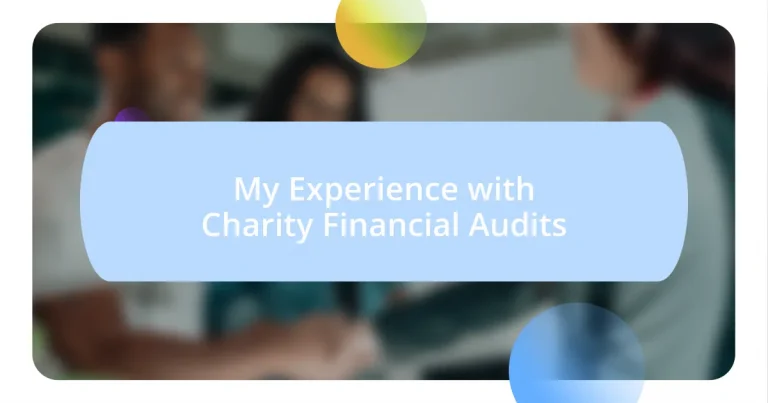Key takeaways:
- Charity financial audits promote transparency and build trust with donors and the community, essential for secure funding and organizational growth.
- The audit process consists of critical steps, including planning, fieldwork, and final reporting, each serving to enhance understanding and improve practices.
- Challenges such as disorganized financial records and staff anxiety can hinder the audit process, but open communication can foster collaboration and ease tensions.
- Embracing audit outcomes as learning opportunities can lead to operational improvements and innovative initiatives, ultimately strengthening the charity’s mission.
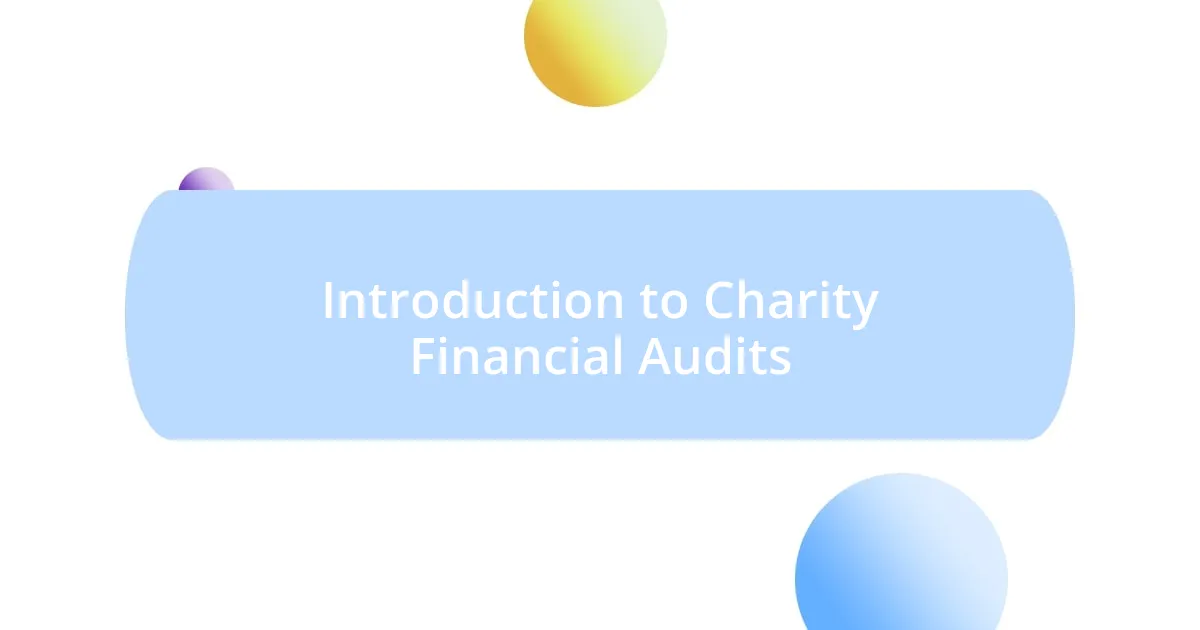
Introduction to Charity Financial Audits
When I first encountered the concept of charity financial audits, I found it a bit daunting. The idea that someone would scrutinize the financial records of a nonprofit organization I cared about made me wonder, “Why is this necessary?” Yet, the more I learned, the more I realized its importance in fostering transparency and trust within the community. Charity financial audits serve as a crucial safeguard, ensuring that funds are allocated and spent appropriately to benefit those in need.
As I delved deeper into this process, I began to appreciate the intricate dance between accountability and mission. I recall a specific moment when my local charity received disappointing results from an audit. It was heartbreaking to see the disappointment in the staff’s eyes, but it also led to a remarkable transformation. They embraced the feedback and turned it into an opportunity for growth, ultimately reinforcing their commitment to ethical stewardship of resources.
In my experience, audits are not merely formalities; they represent significant moments of reflection for organizations. Have you ever wondered how a charity builds trust with its donors? For me, the answer lies in their willingness to undergo financial audits regularly. It signals to supporters and beneficiaries alike that they value their resources and are dedicated to making a measurable impact.
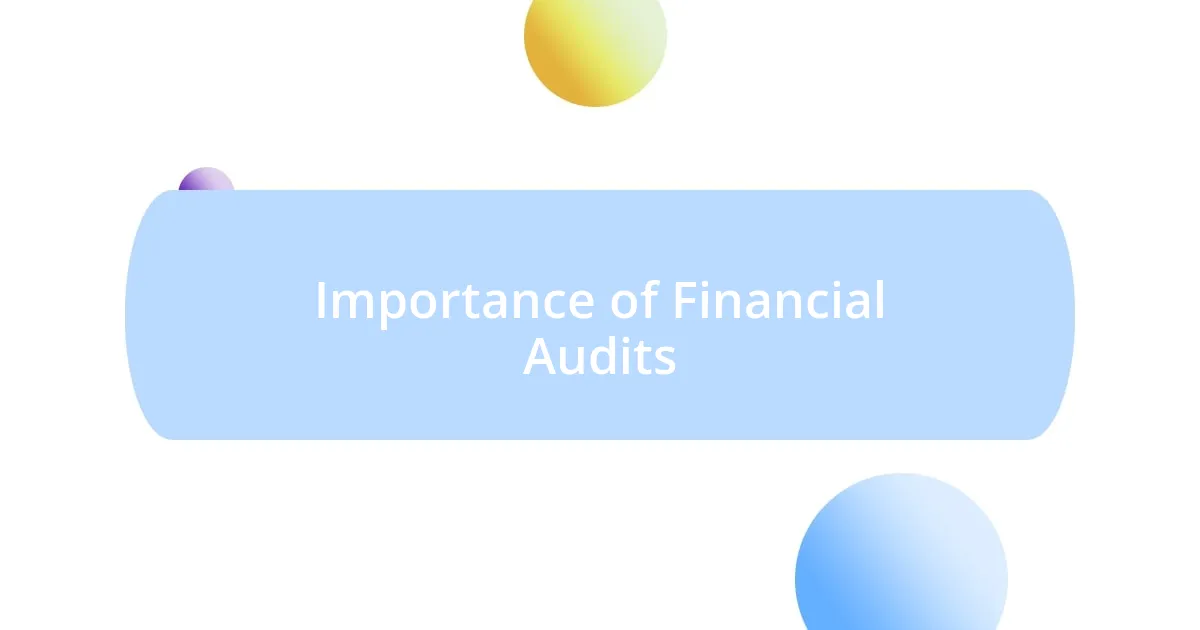
Importance of Financial Audits
Financial audits are essential for charitable organizations because they build trust with donors and the community. I remember a charity I worked with had an unexpected windfall from donations after they published positive audit results. It was incredible to witness how transparency transformed relationships and inspired more people to support their mission. Those audits didn’t just verify compliance; they genuinely reflected the charity’s commitment to accountability.
Moreover, audits act as a mirror, revealing both strengths and areas for improvement within the organization. When the results came back from another audit, the team sat down to discuss what they could enhance. The excitement was palpable as they dug into the feedback, transforming what could have been a negative experience into a pivotal moment for growth. It’s fascinating how the audit process can propel a charity forward rather than hold them back.
One major aspect I’ve noticed is how financial audits can help secure future funding. Foundations and large donors often look for organizations that demonstrate financial integrity. I even witnessed a small charity land a significant grant after successfully completing an audit. It showed funders that they had their financial house in order, giving them confidence to invest. That’s why I believe regular audits not only keep charities accountable but also open doors to new opportunities.
| Aspect | Importance |
|---|---|
| Trust Building | Transparency fosters donor support and community relationships. |
| Organizational Improvement | Identifies strengths and weaknesses for growth. |
| Funding Opportunities | Demonstrates financial integrity to attract potential donors. |
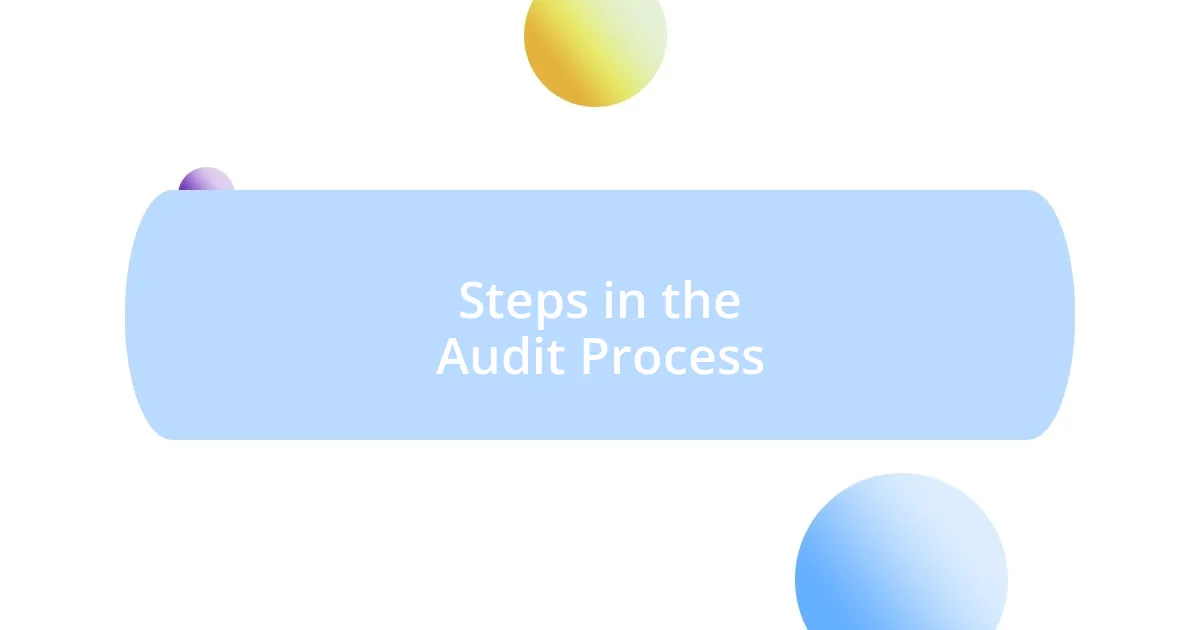
Steps in the Audit Process
The audit process unfolds in several pivotal steps, each designed to ensure clarity and compliance. From what I’ve seen, the initial stage often involves gathering and reviewing financial documents. This sets the foundation for everything that follows. It’s a revelation when you realize how meticulous this part is, considering the myriad of details involved that must be accurately captured and reported.
Here are the typical steps in the charity audit process:
- Planning: Auditors assess the organization’s financial situation and identify areas of focus.
- Fieldwork: Data collection occurs, where auditors verify transactions and inspect financial records.
- Communicating Findings: Once the review is complete, auditors discuss outcomes and any discrepancies they uncover.
- Final Report: A formal report is prepared, summarizing the findings and providing recommendations for improvement.
- Follow-Up: The charity implements suggested changes and prepares for future audits based on insights gained.
In my experience, each of these steps feels like a unique chapter in a larger story. I still remember the palpable tension in the air when auditors arrived for the fieldwork phase at a charity I supported. Volunteers were buzzing with both anxiety and determination, wanting to demonstrate that their hard work was genuinely reflected in the numbers. Being part of that process emphasized to me that every audit is not just a formal assessment; it’s an opportunity for deeper understanding and growth within the organization.
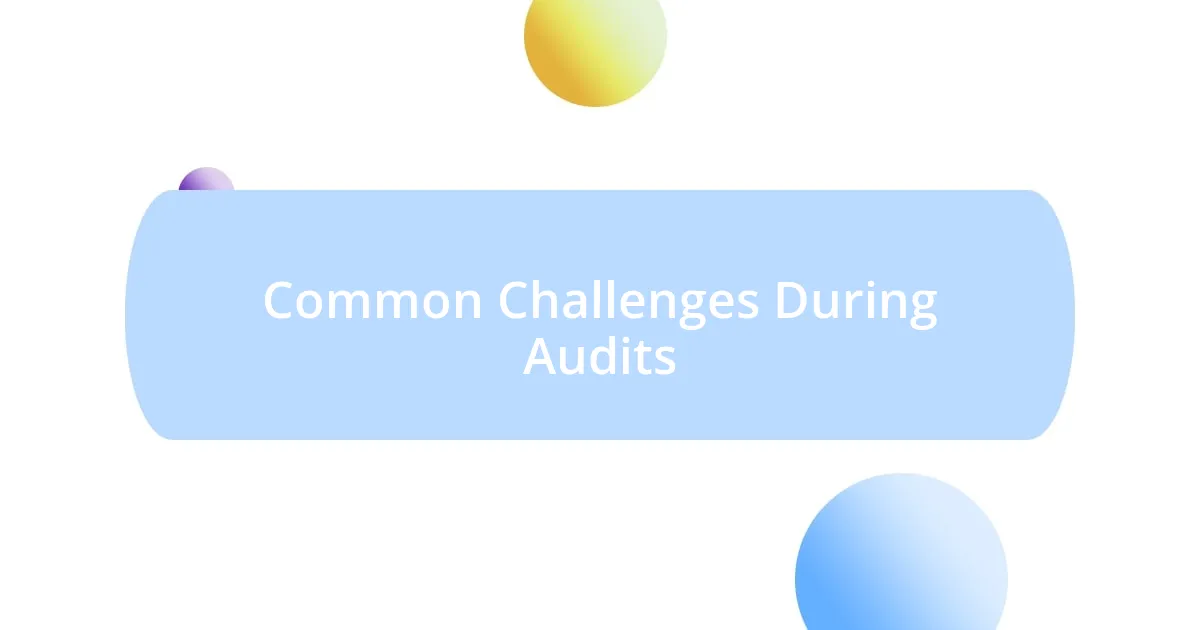
Common Challenges During Audits
Conducting financial audits for charities often presents unique challenges. One notable hurdle I faced was the sometimes overwhelming complexity of financial records. On one occasion, I was confronted with a mountain of disorganized receipts and spreadsheets that made even the most diligent volunteer’s head spin. It left me wondering, how can an organization expect clarity and transparency when their documentation feels more like a chaotic puzzle rather than a clear financial picture?
Another challenge is addressing understanding and collaboration among staff. I recall a situation where some team members felt anxious about the auditors’ probing questions, interpreting them as criticism rather than an opportunity for constructive feedback. Navigating those perceptions was crucial. I found that open communication helped alleviate fears and turned the auditors into allies, rather than adversaries. This shift in mindset truly made a difference in how the audit process unfolded.
Lastly, time constraints can be a significant barrier during audits. I’ve experienced deadlines that felt unreasonably tight, creating a frantic atmosphere. In one particular scenario, we were racing against the clock to finalize reports and reconcile accounts. It makes you wonder: how do smaller organizations manage these pressures when they’re often juggling so many roles? I learned that prioritizing tasks and maintaining a flexible mindset were key strategies in overcoming this challenge—an invaluable lesson for the future.
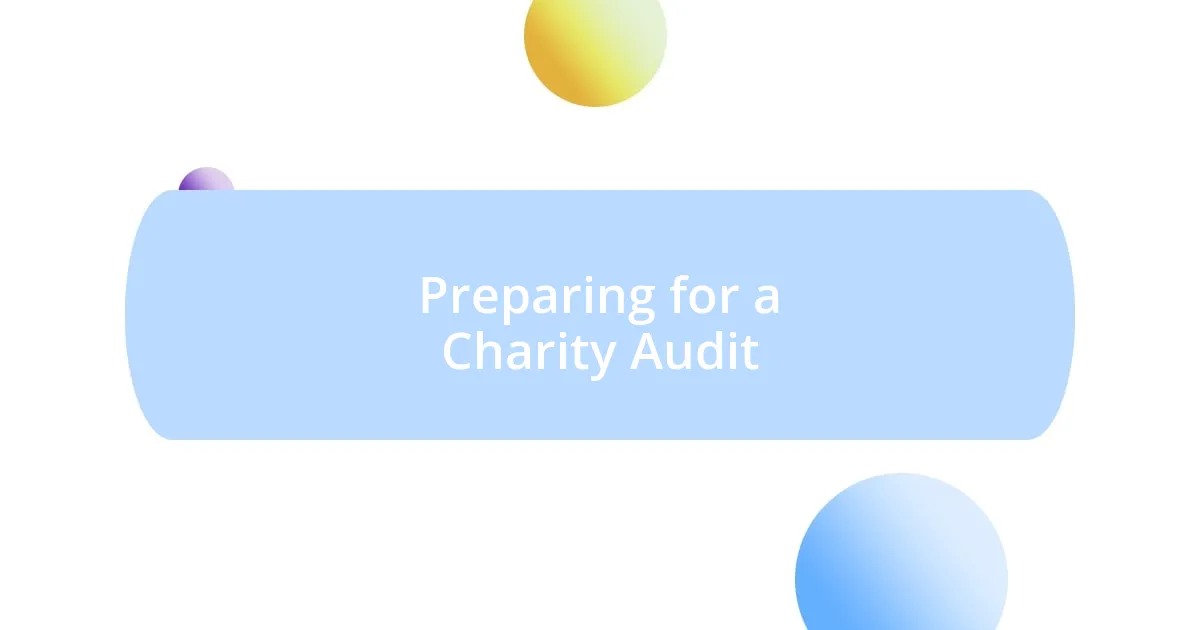
Preparing for a Charity Audit
Preparing for a charity audit is more than just checking boxes; it’s about laying the groundwork for a smooth process. I vividly recall the buzz of activity before an audit, where we gathered our financial records, not just as a formality, but as a way to reflect on our journey. Each document felt like a piece of our mission, and the anticipation of showcasing our efforts was both thrilling and nerve-wracking.
As I sifted through budgets and donation records, I started to see the bigger picture—this wasn’t just about compliance; it was about transparency and integrity. There was this unique blend of pride and anxiety as we double-checked everything. What if something was amiss? Would we be able to justify our financial choices if questioned? These thoughts propelled us to be thorough. I always found that having a checklist tailored for our specific charity helped keep things organized, ultimately easing my mind as we approached audit day.
Moreover, preparation for the audit often requires rallying the whole team. I remember involving everyone in a review session, where we shared insights on our operations. It transformed our preparation from a solitary task into a cohesive team effort. Did anyone else feel this connection? It struck me how audits could foster unity and spur discussions about our future. By tackling potential concerns together, we not only fortified our defenses but also created a shared sense of purpose amid the audit preparation.
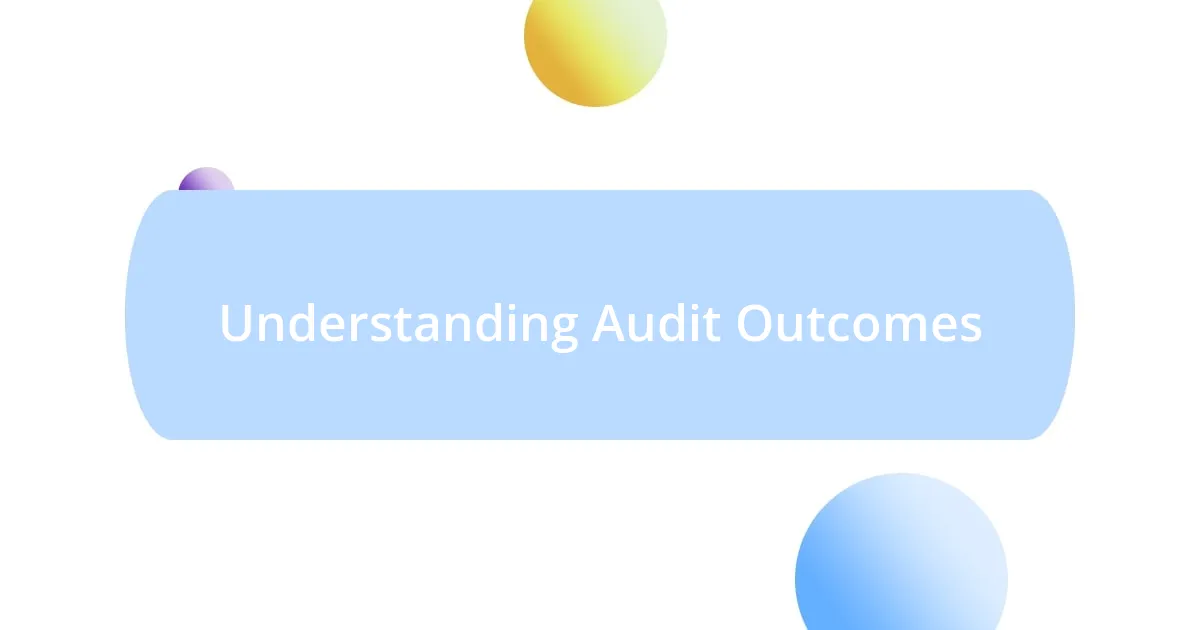
Understanding Audit Outcomes
Understanding audit outcomes is crucial for any charity as it directly impacts transparency and trust. I recall sitting down after a particularly revealing audit and sorting through the findings with my team. That moment was almost like staring at a mirror reflecting not just our financial health but also our values as an organization. It prompted us to evaluate not just what went wrong, but how we could be better stewards of our resources. Isn’t it fascinating how numbers can tell a deeper story about our mission?
One significant outcome I grappled with was the realization that certain financial patterns indicated we needed to reconsider our donor relations strategy. As I reviewed the feedback, I felt a twinge of apprehension; were we truly making the most of our supporters? A shift in perspective was necessary. Instead of viewing those comments as criticisms, I began to see them as opportunities. With a few targeted initiatives, we turned observations into actionable plans, revamping our engagement with donors and ultimately strengthening those relationships.
It’s also essential to embrace the audit outcomes as a learning opportunity. In one audit, we discovered an unexpected shortfall in a program budget, which initially felt disheartening. However, it quickly motivated us to dive deeper into our expense tracking. This setback was a catalyst for launching a series of workshops that taught our team better financial literacy. Reflecting on that experience, I often wonder: how many charities overlook these insights, only to miss the chance for growth? I’ve learned that while audits may seem daunting, they hold the keys to critical evolution for any organization.

Lessons Learned from My Experience
I learned that communication is key throughout the audit process. There was a point when I thought the financial reports were enough to tell our story, but I couldn’t have been more wrong. Engaging with our team regularly—not just during the audit but throughout the year—helped build a transparent environment. Have you ever noticed how open dialogues can uncover underlying issues? It’s incredible how just asking the right questions can lead us to solutions we never considered.
Another lesson was the importance of adapting to feedback. I remember feeling quite defensive during a particularly tough audit session when our policies were scrutinized. Initially, it stung, as if our dedication was being called into question. But with time, I understood that this was an invitation to reflection. How often do we get that kind of constructive criticism? Accepting that feedback with an open mind allowed us to refine our strategies and embrace growth. If we frame criticism as a stepping stone rather than a setback, it can become a powerful tool for transformation.
Lastly, I discovered that audits can actually inspire innovation. While preparing for one audit, we stumbled upon inefficiencies in our fund allocation. The realization that we could better serve our community sparked a brainstorming session that led to a new initiative. Who would have thought a process aimed at compliance could trigger a wave of creativity? Sharing these moments with my team rejuvenated our spirit and reaffirmed our mission. Isn’t it remarkable how challenges can pave the way for fresh ideas?












